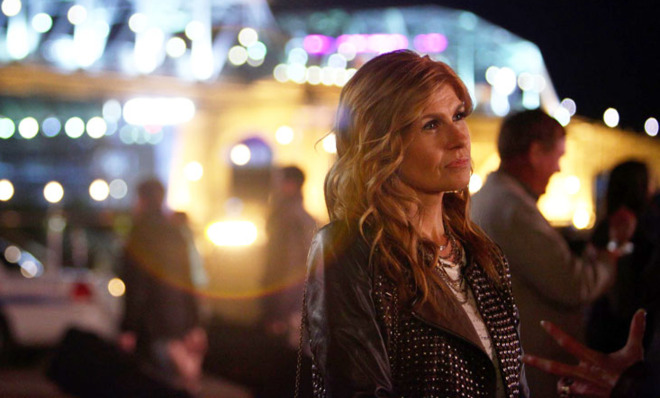Why Connie Britton is the most inspiring woman on TV
The Nashville star is redefining what it means to be an adventurous woman


A free daily email with the biggest news stories of the day – and the best features from TheWeek.com
You are now subscribed
Your newsletter sign-up was successful
The tabloid age has made it harder and harder to truly admire celebrities. When every romance and baby, indiscretion and dimpled thigh is fodder for a cover story, it can be nearly impossible for stars to maintain honest adoration from their fans. Few entertainers have managed to pull this off, and no, they aren't all named Meryl Streep.
Connie Britton, who stars in TV's Nashville, which had its season premiere this week, is one of those rare stars who women not only love, but love to love. She incites a deep respect and an immense joy among her many fans. She's someone we'll root for, listen to, and — rare in the realm of female star worshipping — never harbor jealousy or spite for. Well, except for her hair.
Most Britton fans, of which present company is definitely included, got to know the actress through her role as Tami Taylor on Friday Night Lights. As Tami, Britton took what could have been the most one-dimensional of characters, a football coach's wife, and turned her into a woman with a sense of destiny that was all her own. She began the show as a stay-at-home mom and unofficial cheerleader, turned into a pro-abortion-rights school principal, and ended it as assistant director of admissions at a college far away from Texas, with her husband in tow. As Britton explained in an interview, she was "rabid" about making sure Tami had a complex narrative arc, and she was described by the director as "inspiring" though "sometimes she could be a pain."
The Week
Escape your echo chamber. Get the facts behind the news, plus analysis from multiple perspectives.

Sign up for The Week's Free Newsletters
From our morning news briefing to a weekly Good News Newsletter, get the best of The Week delivered directly to your inbox.
From our morning news briefing to a weekly Good News Newsletter, get the best of The Week delivered directly to your inbox.
While Nashville is a far campier series, Britton's plays country legend Rayna Jaymes with a naturalness and dignity that would just as easily make sense in an arty, more cerebral film project.
Perhaps the key to her success in both roles has to do with the fact that Britton is a real grown-up, a mature and responsible woman who also is capable of entertaining a sense of possibility and chance in her own life. This is an extremely rare thing.
A.O. Scott's much discussed recent article "The Death of Adulthood in American Culture" chronicles the shifting nature of masculinity and maturity and the author's own conflicted feelings about. In it, he quotes mid-century literary critic Leslie A. Fiedler, who examined the long tradition of praising rebellious men in American literature in his book Love and Death in the American Novel.
"The typical male protagonist of our fiction has been a man on the run, harried into the forest and out to sea, down the river or into combat — anywhere to avoid 'civilization,' which is to say the confrontation of a man and woman which leads to the fall to sex, marriage, and responsibility," Fielder wrote.
A free daily email with the biggest news stories of the day – and the best features from TheWeek.com
Indeed. Women have long been burdened with staying the safe and steady course, sorting out all that civilization stuff, like meals and clean clothes, while men like Huckleberry Finn and Paul Rudd got to carry on their adventures.
During the later half of the 20th century, we saw a rejection of this trope for women, as more and more fictional females broke free of their domestic responsibilities and set off on adventures of their own in blockbuster films and books like Thelma and Louise, (written by Nashville creator Callie Khouri) Eat, Pray, Love, and Wild. But as powerful and important as these stories are, none of them entirely breaks the mold of having to leave "civilization" in order to discover the important stuff.
Both Tami Taylor and Rayna Jaymes — and Britton herself, from what we can tell about her via interviews — are devoted and satisfied mothers who have still managed to hold onto their capacity for adventure. Taylor finds it mostly through her professional work, and Jaymes mostly through romance, or, more accurately, romances. For Britton herself, the combination of adopting a son on her own and the rare achievement of being an actress whose career peaks in her 40s makes her a living testament to her characters' insistence that the story definitely goes on. This isn't so much about that old canard, having it all, but about feeling entitled to want and even expect more.
In To the Lighthouse, Virginia Woolf writes about the importance of alone time for women:
Although she continued to knit, and sat upright, it was thus that she felt herself; and this self having shed its attachments was free for the strangest adventures. When life sank down for a moment, the range of experience seemed limitless. [To the Lighthouse]
Britton is the coda to this line of thought, a postscript that came three-quarters of a century later telling us that shedding one's attachments are no longer required for the strangest adventures.
Elissa Strauss writes about the intersection of gender and culture for TheWeek.com. She also writes regularly for Elle.com and the Jewish Daily Forward, where she is a weekly columnist.
